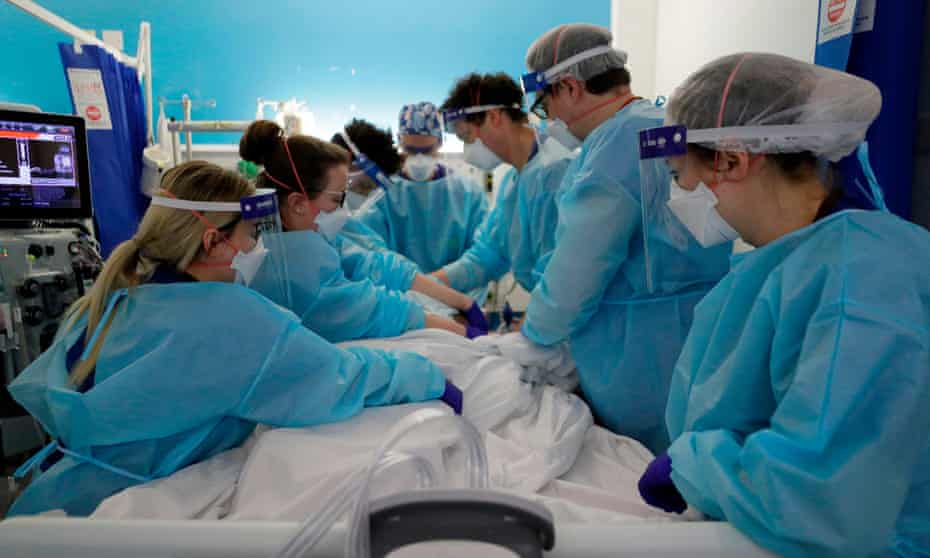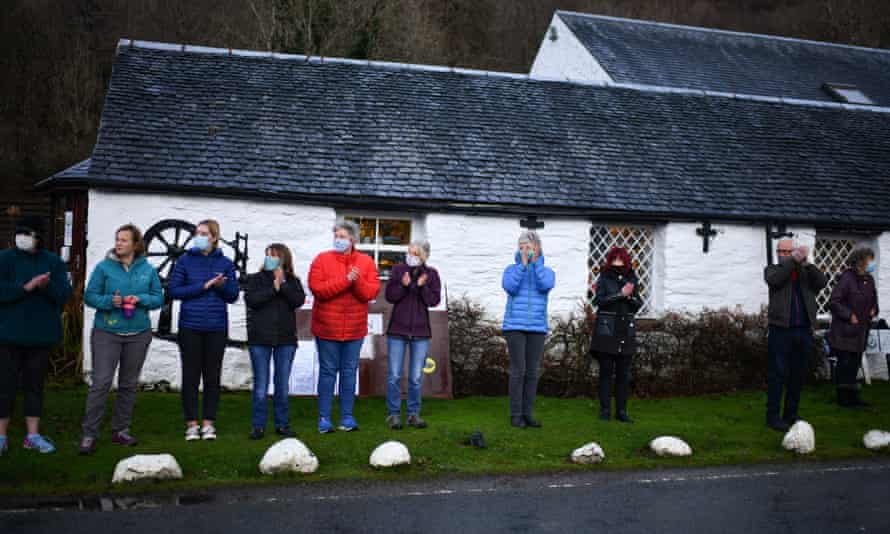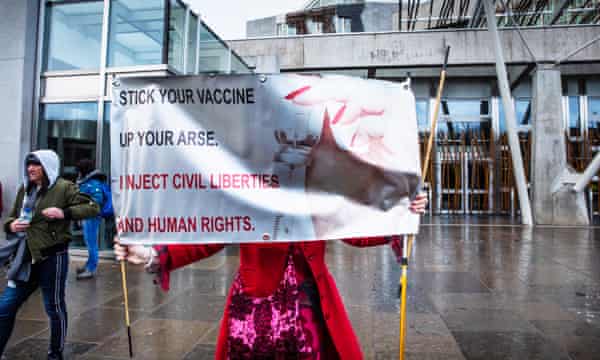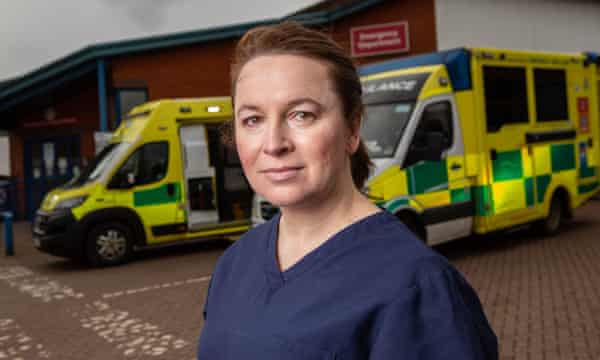'I’ve been called Satan': Dr Rachel Clarke on facing abuse in the Covid crisis

Critical care staff turn a Covid-19 patient on the Christine Brown ward at King’s College Hospital in London on 27 January. Photograph: Kirsty Wigglesworth/AFP/Getty Images
As well as fighting to keep Covid patients alive, NHS staff are now battling a surge in abuse and denial in the second wave. Dr Rachel Clarke on how she is coping – and what gives her hope

Rachel Clarke
@doctor_oxford
Sat 6 Feb 2021
Please imagine it, for a moment, if you can bear to. Being wheeled from your home by paramedics in masks who rush you, blue-lit, to a hospital. Then the clamour and lights, the confusion and fear, the faceless professionals, gloved and gowned, who eddy and swirl past your trolley. Your destination is intensive care where too soon, or perhaps not soon enough, you will arrive at a point of reckoning. You will blanch when they tell you, because you’ve watched the news and know what it signifies: you are going to be put on a ventilator. You will understand, as clearly as they do, that your doctors cannot promise to save you.
Here, though, is the detail that haunts me. For every patient who dies from Covid-19 in hospital, from the moment they encounter that first masked paramedic, they will never see a human face again. Not one smile, nor pair of cheeks, nor lips, nor chin. Not a single human being without barricades of plastic. Sometimes, my stomach twists at the thought that to the patients whose faces I can never unsee – contorting and buckling with the effort of breathing – I am no more than a pair of eyes, a thin strip of flesh between mask and visor, a muffled voice that strains and cracks behind plastic.
Of all Covid’s cruelties, surely the greatest is this? That it cleaves us from each other at precisely those times when we need human contact the most. That it spreads through speech and touch – the very means through which we share our love, tenderness and basic humanity. That it transforms us unwittingly into vectors of fatality. And that those we love most – and with whom we are most intimate – are the ones we endanger above all others.
It’s late January. The wards and ICUs are overwhelmed, awash with the virus. The patients seem younger, the new variant more virulent. We are drowning, drowning in Covid. The sight of a doctor or nurse breaking down has become unremarkable. Too close, for too long, to too many patients’ pain, we have become – just like them – saturated. Behind hospital doors, tucked away out of sight, we seem to suffer as one.
Outside, on the other hand, the virus has once again carved up the country into simmering, resentful, aggrieved little units. It’s too old, too cold to be doing this again. One way or another, lockdown hurts us all. But instead of unity, community and a shared sense of purpose – that extraordinary eruption of philanthropy last springtime – we seethe like rats in a sack, fractious, divided.
One morning, on the way to work, the politicians and the trolls and the suffering and the death become too much. All of a sudden, I’m unable to drive
During the first wave, I knew the public had our backs. This time round, being an NHS doctor makes you a target. For the crime of asserting on social media that Covid is real and deadly, I earn daily abuse from a vitriolic minority. I’ve been called Hitler, Shipman, Satan and Mengele for insisting on Twitter that our hospitals aren’t empty. Last night a charming “Covid sceptic” sent me this: “You are paid to lie and a disgrace to your profession. You have clearly sold your soul and are nothing more than a child abuser destroying futures. I do not consent to your satanic ways.” A friend, herself an intensive care doctor, has just been told by another male “sceptic” that he intends to sexually abuse her until she requires one of her own ventilators. And this morning, another colleague, also female, was told: “You evil criminal lying piece of government shit. You need to be executed immediately for treason and genocide.”
In short, we have reached the point in the pandemic where what feels like armies of trolls do their snarling, misogynistic utmost to silence NHS staff who try to convey what it’s like on the inside. Worse even than the hatred they whip up against NHS staff, the deniers have started turning up in crowds to chant “Covid is a hoax” outside hospitals full of patients who are sick and dying. Imagine being forced to push your way through that, 13 hours after you began your ICU shift. Some individuals have broken into Covid wards and attempted physically to remove critically ill patients, despite doctors warning that doing so will kill them.

As well as fighting to keep Covid patients alive, NHS staff are now battling a surge in abuse and denial in the second wave. Dr Rachel Clarke on how she is coping – and what gives her hope

Rachel Clarke
@doctor_oxford
Sat 6 Feb 2021
Please imagine it, for a moment, if you can bear to. Being wheeled from your home by paramedics in masks who rush you, blue-lit, to a hospital. Then the clamour and lights, the confusion and fear, the faceless professionals, gloved and gowned, who eddy and swirl past your trolley. Your destination is intensive care where too soon, or perhaps not soon enough, you will arrive at a point of reckoning. You will blanch when they tell you, because you’ve watched the news and know what it signifies: you are going to be put on a ventilator. You will understand, as clearly as they do, that your doctors cannot promise to save you.
Here, though, is the detail that haunts me. For every patient who dies from Covid-19 in hospital, from the moment they encounter that first masked paramedic, they will never see a human face again. Not one smile, nor pair of cheeks, nor lips, nor chin. Not a single human being without barricades of plastic. Sometimes, my stomach twists at the thought that to the patients whose faces I can never unsee – contorting and buckling with the effort of breathing – I am no more than a pair of eyes, a thin strip of flesh between mask and visor, a muffled voice that strains and cracks behind plastic.
Of all Covid’s cruelties, surely the greatest is this? That it cleaves us from each other at precisely those times when we need human contact the most. That it spreads through speech and touch – the very means through which we share our love, tenderness and basic humanity. That it transforms us unwittingly into vectors of fatality. And that those we love most – and with whom we are most intimate – are the ones we endanger above all others.
It’s late January. The wards and ICUs are overwhelmed, awash with the virus. The patients seem younger, the new variant more virulent. We are drowning, drowning in Covid. The sight of a doctor or nurse breaking down has become unremarkable. Too close, for too long, to too many patients’ pain, we have become – just like them – saturated. Behind hospital doors, tucked away out of sight, we seem to suffer as one.
Outside, on the other hand, the virus has once again carved up the country into simmering, resentful, aggrieved little units. It’s too old, too cold to be doing this again. One way or another, lockdown hurts us all. But instead of unity, community and a shared sense of purpose – that extraordinary eruption of philanthropy last springtime – we seethe like rats in a sack, fractious, divided.
One morning, on the way to work, the politicians and the trolls and the suffering and the death become too much. All of a sudden, I’m unable to drive
During the first wave, I knew the public had our backs. This time round, being an NHS doctor makes you a target. For the crime of asserting on social media that Covid is real and deadly, I earn daily abuse from a vitriolic minority. I’ve been called Hitler, Shipman, Satan and Mengele for insisting on Twitter that our hospitals aren’t empty. Last night a charming “Covid sceptic” sent me this: “You are paid to lie and a disgrace to your profession. You have clearly sold your soul and are nothing more than a child abuser destroying futures. I do not consent to your satanic ways.” A friend, herself an intensive care doctor, has just been told by another male “sceptic” that he intends to sexually abuse her until she requires one of her own ventilators. And this morning, another colleague, also female, was told: “You evil criminal lying piece of government shit. You need to be executed immediately for treason and genocide.”
In short, we have reached the point in the pandemic where what feels like armies of trolls do their snarling, misogynistic utmost to silence NHS staff who try to convey what it’s like on the inside. Worse even than the hatred they whip up against NHS staff, the deniers have started turning up in crowds to chant “Covid is a hoax” outside hospitals full of patients who are sick and dying. Imagine being forced to push your way through that, 13 hours after you began your ICU shift. Some individuals have broken into Covid wards and attempted physically to remove critically ill patients, despite doctors warning that doing so will kill them.

‘Human kindness will not be locked down’ … people clap as a funeral cortege passes through Glencoe, Scotland. Photograph: Jeff J Mitchell/Getty Images
I well understand why they want to gag us. Our testimony makes Covid denial a tall order. We bear witness not to statistics but to human beings. Our language is flesh and blood. This patient, and then this patient, and then another. The pregnant woman in her 20s on ICU, intubated and lifeless. The three generations of one family on ventilators, each of them dying one after the other. We humanise, empathise, turn the unfathomable dimensions of the 100,000 dead into mothers, fathers, sisters, brothers. Increasingly, speaking out feels like a moral imperative. Because perhaps – if we can only disprove enough untruths, if we can just slow the onslaught of disinformation – we may have fewer dying hands to hold in the future.
Please don’t flinch. Please don’t look away. The truth of conditions inside our hospitals needs telling. To dispel a few prime ministerial press conference myths, the NHS is not “close to” or “on the brink of” being overwhelmed. We are here and now in the midst of calamity. The Covid patients keep on coming, so unnervingly unwell, and we race to find space for them. But all the spare staff have already been snatched from their day jobs. Elective surgery has shut down, everything inessential postponed. ICUs are filled with obstetricians, paediatricians, psychiatrists and surgeons doing their amateur best to support the small pool of staff with proper expertise. On wards across the country, where Covid patients live and die in their thousands, the medics are stretched perilously thinly. And still the new admissions come.
This week, a doctor friend in another trust sent me this, having been newly redeployed to her hospital’s ICU: “The situation at work is just dreadful. Once I’ve donned PPE and gone into ICU, hours and hours go by. And it’s just awful in there. It’s not calm like the news videos, it’s chaotic with alarms going constantly, patients being intubated and proned. Most of us are NOT trained to do this or deal with this. We are surgeons, anaesthetists, physicians, nurses, HCAs, porters etc. We are NOT ICU staff.”
It did not have to be like this. None of these horrors were inevitable
Newly qualified doctors with scarcely six months’ experience sometimes struggle singlehanded on the Covid wards at night, their seniors unable to leave crashing patients elsewhere. Whoever deteriorates overnight may live or die according to whether a bed can be found on ICU. This is rationing, without being named out loud as such. An unacknowledged peacetime form of battlefield triage: lives being lost because there aren’t enough staff to go around. No one here is being “protected”, not the patients, not the nurses, not the doctors, not the families, and certainly not the NHS writ large.
Sometimes, colleagues confess that they feel suicidal. Sometimes, in the darkness, a patient pleads to die. They cannot take the claustrophobic roar of their CPAP mask any longer. The struggle to breathe is costing them more than they can bear. A student I used to teach looks close to collapse. “I feel as if it might be my fault when they die,” he tells me in a monotone. “If I’d been a doctor for longer, I might know how to do something different. Maybe it’s me – maybe I’m not cut out to be a doctor.” I watch him wrestle to keep his tears at bay, unable even to reach out to give him a hug. The wrongness of it all constricts my chest until it hurts. He’s too young, too green to be standing here like this, accusing himself of failing the pandemic dead, who themselves have been failed by so many in power above. At what cost do these night shifts worm into his soul?
The truth is, patients of necessity are falling through our cracks. We cannot hold them all, we’re too few and too ground down. Rationing does not declare itself in a fanfare of noise. It sidles in, bit by bit, as the Covid cases rise. Intensive care nurses, used to working with a concentration of one nurse per patient, are asked to stretch themselves across four patients or more. Standards start to slip as battered, shell-shocked staff do their brave and hopeless best against the ever-surging human tide. The truth – and don’t we know it, if we’re honest? – is that doctors and nurses are neither angels nor heroes. We’re human. Merely human. We can only do so much.

I well understand why they want to gag us. Our testimony makes Covid denial a tall order. We bear witness not to statistics but to human beings. Our language is flesh and blood. This patient, and then this patient, and then another. The pregnant woman in her 20s on ICU, intubated and lifeless. The three generations of one family on ventilators, each of them dying one after the other. We humanise, empathise, turn the unfathomable dimensions of the 100,000 dead into mothers, fathers, sisters, brothers. Increasingly, speaking out feels like a moral imperative. Because perhaps – if we can only disprove enough untruths, if we can just slow the onslaught of disinformation – we may have fewer dying hands to hold in the future.
Please don’t flinch. Please don’t look away. The truth of conditions inside our hospitals needs telling. To dispel a few prime ministerial press conference myths, the NHS is not “close to” or “on the brink of” being overwhelmed. We are here and now in the midst of calamity. The Covid patients keep on coming, so unnervingly unwell, and we race to find space for them. But all the spare staff have already been snatched from their day jobs. Elective surgery has shut down, everything inessential postponed. ICUs are filled with obstetricians, paediatricians, psychiatrists and surgeons doing their amateur best to support the small pool of staff with proper expertise. On wards across the country, where Covid patients live and die in their thousands, the medics are stretched perilously thinly. And still the new admissions come.
This week, a doctor friend in another trust sent me this, having been newly redeployed to her hospital’s ICU: “The situation at work is just dreadful. Once I’ve donned PPE and gone into ICU, hours and hours go by. And it’s just awful in there. It’s not calm like the news videos, it’s chaotic with alarms going constantly, patients being intubated and proned. Most of us are NOT trained to do this or deal with this. We are surgeons, anaesthetists, physicians, nurses, HCAs, porters etc. We are NOT ICU staff.”
It did not have to be like this. None of these horrors were inevitable
Newly qualified doctors with scarcely six months’ experience sometimes struggle singlehanded on the Covid wards at night, their seniors unable to leave crashing patients elsewhere. Whoever deteriorates overnight may live or die according to whether a bed can be found on ICU. This is rationing, without being named out loud as such. An unacknowledged peacetime form of battlefield triage: lives being lost because there aren’t enough staff to go around. No one here is being “protected”, not the patients, not the nurses, not the doctors, not the families, and certainly not the NHS writ large.
Sometimes, colleagues confess that they feel suicidal. Sometimes, in the darkness, a patient pleads to die. They cannot take the claustrophobic roar of their CPAP mask any longer. The struggle to breathe is costing them more than they can bear. A student I used to teach looks close to collapse. “I feel as if it might be my fault when they die,” he tells me in a monotone. “If I’d been a doctor for longer, I might know how to do something different. Maybe it’s me – maybe I’m not cut out to be a doctor.” I watch him wrestle to keep his tears at bay, unable even to reach out to give him a hug. The wrongness of it all constricts my chest until it hurts. He’s too young, too green to be standing here like this, accusing himself of failing the pandemic dead, who themselves have been failed by so many in power above. At what cost do these night shifts worm into his soul?
The truth is, patients of necessity are falling through our cracks. We cannot hold them all, we’re too few and too ground down. Rationing does not declare itself in a fanfare of noise. It sidles in, bit by bit, as the Covid cases rise. Intensive care nurses, used to working with a concentration of one nurse per patient, are asked to stretch themselves across four patients or more. Standards start to slip as battered, shell-shocked staff do their brave and hopeless best against the ever-surging human tide. The truth – and don’t we know it, if we’re honest? – is that doctors and nurses are neither angels nor heroes. We’re human. Merely human. We can only do so much.

An anti-lockdown demonstration in Edinburgh in January.
Photograph: Murdo MacLeod/The Guardian
I can’t sleep. I can’t sit still. I feel sick. I want to scream. Something monstrous, like cancer, is twisting in my chest. One morning, on the way to work, the politicians and the trolls and the suffering and the death become too much. All of a sudden, I’m unable to drive. In a layby I cringe, doubled up, fighting for breath. My body is in mutiny, it’s overruled my head. You clench your teeth, wipe your cheeks, turn the ignition, set off again. You must go on. I can’t go on. I’ll go on.
A unity of sorts emerges with the stupefying news that in Britain, an island, the cumulative Covid death toll has surpassed 100,000. On the same day, we learn that our death rate per head of population is the highest in the world. As the country reels from these calamitous statistics, the prime minister insists that his government “truly did everything we could to minimise loss of life”. Yet a quarter of those deaths have occurred in 2021 – during the last four weeks alone – making Boris Johnson’s words a patent lie. He didn’t lock down promptly, he didn’t close our borders, he didn’t protect care homes, he allowed tens of thousands of elderly and vulnerable residents to die. And then, instead of future-proofing Britain from a second surge last summer, he offered bribes for social mixing. But our eating out, far from helping out, sent Covid cases ticking hungrily upwards.
I can’t sleep. I can’t sit still. I feel sick. I want to scream. Something monstrous, like cancer, is twisting in my chest. One morning, on the way to work, the politicians and the trolls and the suffering and the death become too much. All of a sudden, I’m unable to drive. In a layby I cringe, doubled up, fighting for breath. My body is in mutiny, it’s overruled my head. You clench your teeth, wipe your cheeks, turn the ignition, set off again. You must go on. I can’t go on. I’ll go on.
A unity of sorts emerges with the stupefying news that in Britain, an island, the cumulative Covid death toll has surpassed 100,000. On the same day, we learn that our death rate per head of population is the highest in the world. As the country reels from these calamitous statistics, the prime minister insists that his government “truly did everything we could to minimise loss of life”. Yet a quarter of those deaths have occurred in 2021 – during the last four weeks alone – making Boris Johnson’s words a patent lie. He didn’t lock down promptly, he didn’t close our borders, he didn’t protect care homes, he allowed tens of thousands of elderly and vulnerable residents to die. And then, instead of future-proofing Britain from a second surge last summer, he offered bribes for social mixing. But our eating out, far from helping out, sent Covid cases ticking hungrily upwards.

Dr Rachel Clarke. Photograph: Antonio Olmos/The Observer
This second wave has been turbocharged by Downing Street’s procrastination. Putting off lockdown until the eleventh hour has – yet again – wreaked havoc. Urgent cancer surgeries should not be postponed. Covid patients should not be calling Ubers to rush them to hospital because the ambulances they need are nowhere to be found. Doctors and nurses should not be suicidal with stress, nor tended by their own as they suffocate and die on ventilators. It did not have to be like this. None of these horrors were inevitable.
This second wave has been turbocharged by Downing Street’s procrastination. Putting off lockdown until the eleventh hour has – yet again – wreaked havoc. Urgent cancer surgeries should not be postponed. Covid patients should not be calling Ubers to rush them to hospital because the ambulances they need are nowhere to be found. Doctors and nurses should not be suicidal with stress, nor tended by their own as they suffocate and die on ventilators. It did not have to be like this. None of these horrors were inevitable.
Every single day at work, I see more kindness, more sweetness, more compassion than you could ever, ever imagine
How – from where – can we find cause for hope when our political leaders, despite a track record like this, insist they’ve behaved infallibly? Well, by early spring, the country’s most vulnerable citizens should be vaccinated, a prospect that makes me ecstatic. And lockdown has already sent new cases plummeting downwards. The deaths, we know, will follow. Momentum too is building towards a zero Covid strategy – the complete elimination of the virus – as demonstrated so successfully by countries such as New Zealand, Taiwan and Vietnam.
But my main reasons for optimism lie closer to home, flickering and sparking amid the darkness. I turn my gaze from the dizzying statistics and look instead to the human beings around me. Their ingenuity and kindness give me the steel to go on. One day, for example, a peculiar procession outside the hospital turns heads on the high street. It is led by a strangely immaculate tractor, freshly waxed and wreathed with flowers, gleaming beneath the winter sun. The tractor is destined for a nearby village, hauling an agricultural trailer on which a coffin has been laid. Several cars follow, their stern-faced drivers dressed in black. It’s the funeral cortege of a larger-than-life farmer, known to all in his village and far beyond. Pre-Covid, hundreds of locals would have packed into the village church, eager to pay tribute to a man much loved. Now though, a virus dictates our forms of mourning. No large gatherings are allowed.
When the tractor arrives in the village, lumbering slowly towards the empty church, something magical and startling begins to unfold. Word of mouth and social media have told the neighbours when the cortege will pass and now, on their doorsteps and in porches, behind their gates, on garden paths, they assemble at a respectful social distance. As the tractor passes, so begins the applause. First a ripple, then a clatter, then a thunder, then a roar. In physical estrangement, a population finds its voice. This community, unbowed, celebrates a man they loved – and how. My heart lifts. I feel hope flicker. For however bleak the times, however grim our prospects seem, human kindness finds a shape and form: it will not be locked down.
All across the hospital, you see it. In the tiny crocheted crimson hearts, made by locals for patients and delivered in their scores so that no one feels alone. In the piles of donated pizzas, devoured at night by ravenous staff. In the homemade scrubs, whipped up by an unstoppable army of self-isolating grandmothers whose choice in fabrics is fearlessly floral. In the nurses and carers and porters and cleaners who keep on, despite everything, smiling. I may be tired and angry and sometimes mad with grief, but every single day at work, I see more kindness, more sweetness, more compassion, more courage, more resilience, more steel, more diamond-plated love than you could ever, ever imagine. And this means more and lasts more than anything else, and it cannot be stolen by Covid.
Breathtaking: Inside the NHS in a Time of Pandemic by Dr Rachel Clarke is published by Little, Brown
No comments:
Post a Comment